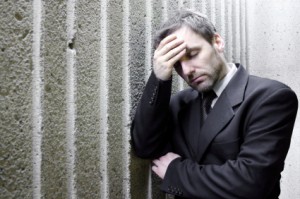Major Depressive Disorder – also referred to as unipolar depression – affects nearly 15 million adults in America each year. This debilitating disorder can make it difficult to go to work and carry out normal social functions. Also known as clinical depression, major depressive disorder is characterized by a persistent gloomy outlook and can be caused by traumatic events in the patient’s life. It may interfere with a person’s ability to eat, sleep or work and can grow worse without medical care.
Symptoms of Major Depressive Disorder
Any symptoms that persist for longer than a couple of weeks may be a sign of major depressive disorder. If the patient has undergone these feelings for an extended period of time, they should immediately contact a doctor.
Among other things, a patient may experience some of the following symptoms:
- Feelings of anxiousness or worry
- Loss of interest in formerly pleasurable activities
- Headaches
- Feeling consistently gloomy, sad or blue
- A sudden increase or decrease in appetite
- Trouble sleeping, insomnia or sleeping excessive amounts
- Suicidal thoughts or plans
- Feeling either slowed down or exceptional restlessness
- Difficulties concentrating or forming thoughts
- Sexual problems
- Feelings of worthlessness, hopelessness and helplessness
- Feeling guilty or pessimistic
- Digestive problems
- Sudden fluctuations in weight
Each person experiences depression differently. While some people may be unable to sit still, eat or even fall asleep, other people over eat, sleep excessively and feel drained of energy. Since each person is different, monitoring the signs of major depressive disorder is important for the diagnosis and treatment to be effective.
Causes and Risk Factors of Major Depressive Disorder
Although many people become depressed as a result of something new occurring in their life, other people begin with a genetic predisposition for depression. Patients who have family members who have battled with depression in their lives are more likely to deal with major depressive disorder.
Environmental factors can often serve as a catalyst for a depressive episode. If a patient is undergoing financial problems, a recent childbirth, a chronic illness or the recent loss of a loved one, they are more likely to develop clinical depression. These unwelcome changes in an individual’s lifestyle can influence a person’s outlook on the world. If they already have a family history or a personality that is likely to become depressed, the sudden change in their life may produce an episode.
Physiologically, individuals who suffer from stress, low self-esteem or a pessimistic attitude are more likely to develop a major depressive disorder.
When all of these factors combine, a patient has a higher likelihood of becoming clinically depressed.
For a select number of patients, certain medications or illnesses may play a role in their depression. Cancer has been known to cause depression in individuals and studies also show certain medications can increase the chances of someone dealing with a Major Depressive Episode. If a patient is currently taken certain heart medications or sedatives, they are more inclined toward being depressed.
Getting Diagnosed
To become diagnosed with major depressive disorder, a patient must experience at least five of the symptoms of depression for a period of two weeks. After consulting with a doctor and usually an examination the patient may be sent in for various tests to determine that other medical conditions are not to blame.
Certain conditions like cancer or hypothyroid can produce depression or depression-like symptoms in patients so it’s important that these are first ruled out as causes of an individual’s depressive state. Once the results of these medical tests come back negative, the doctor will take a closer look at the possibility that the patient is depressed.
As the physician considers the possibility, they will take a close look at the patient’s family history, symptoms and duration of the symptoms. There is no physical test for depression, so the physician relies entirely on what the patient feels they are experiencing.
It is important at this stage that a patient is completely honest with the physician. As they search for an effective treatment among the various treatments available, it is vital that the doctor knows exactly which symptoms are being experienced in order to make an accurate diagnosis. Once the diagnosis is made, the patient can begin with the recommended treatment plan.
Treatment of Major Depressive Disorder
Treatment options for unipolar depression range from medication and psychotherapy to electroconvulsive therapy and naturopathic techniques. In general, patients will usually be put on one of the 20 different antidepressant drugs that are currently available. Each person reacts differently to drugs, so the treatment plan must be completely tailored to the individual case.
 The most common prescription medication options are Tricyclic antidepressants, Monoamine oxidase inhibitors, Lithium carbonates and selective serotonin reuptake inhibitors. Each medication works in a different manner to change the brains chemistry and produce a happier frame of mind. If medication alone does not help, the doctor may recommend a course of psychotherapy.
The most common prescription medication options are Tricyclic antidepressants, Monoamine oxidase inhibitors, Lithium carbonates and selective serotonin reuptake inhibitors. Each medication works in a different manner to change the brains chemistry and produce a happier frame of mind. If medication alone does not help, the doctor may recommend a course of psychotherapy.
The most commonly used psychotherapy option is Cognitive Behavioral Therapy. This psychological counseling works to change the way that the patient views the world. After undergoing a bout of depression, the patient may have developed a habit of viewing every situation and outcome in a negative light.
With this therapy technique, psychologists work with the patient to create an atmosphere where the patient learns how to change their behavior and manner of thinking. On occasion, doctors may recommend that patients receive Interpersonal Therapy or Group Therapy. Both therapy options teach the patient how to develop and maintain relationships in a safe, supportive environment.
For severely depressed patients doctors may choose to do Electroconvulsive Therapy if every other option has not worked. Electroconvulsive Therapy – often referred to as ECT – involves sending small electric currents through electrodes that are placed on the person’s temples. This method is currently believed to change the way the chemicals in the brain function.
If the patient declines to take medication or other therapy treatments, naturopaths have achieved some success with an herb known as St. John’s Wort. Although there is no conclusive research about the effectiveness of this natural remedy, over the past few centuries this herb has been used to treat the signs of major depression and has shown some success.
Additionally, a naturopath may recommend an improved diet and exercise. The brain/body connection has been well documented over time. Patients who exercise release endorphins that improve their mood and outlook on life.
For a more natural approach, exercise, diet and St. John’s Wort are often the first treatment option a naturopath will turn to.
Prognosis for Major Depressive Disorder
Patients who are suffering from major depressive disorder can seek treatment to alleviate their condition. With the help of doctors and psychologists, depression can be overcome and the prognosis is favorable.
For individuals who choose not to receive help or follow the treatment plan as instructed there is a higher chance of the depressive episode growing more severe even possibly resulting in a suicide or homicide. Anyone who is currently dealing with the symptoms of depression should seek qualified medical help. Only a professional can make a diagnosis and decide which treatment option is best for the patient.
Related Posts




